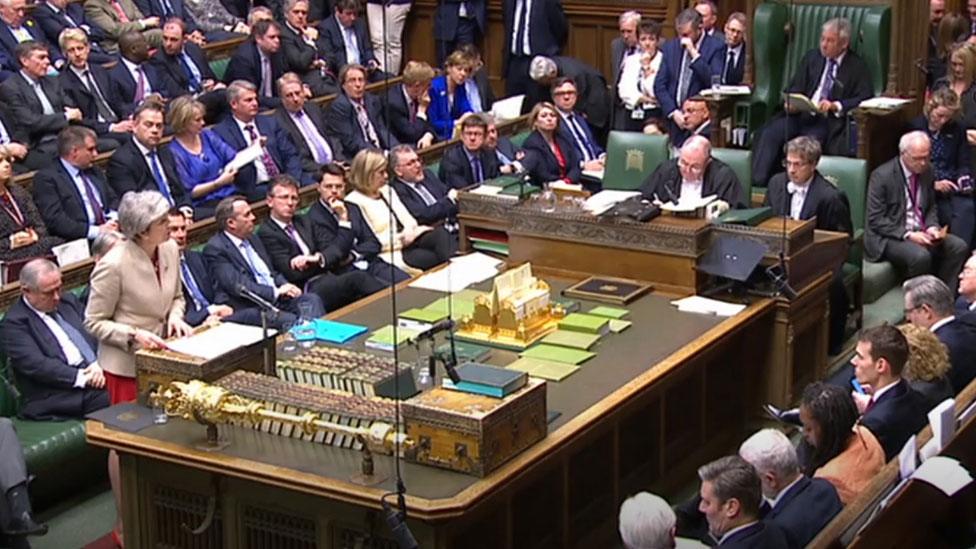Brexit: MPs await results of votes on alternatives to Theresa May's deal
- Published
- comments
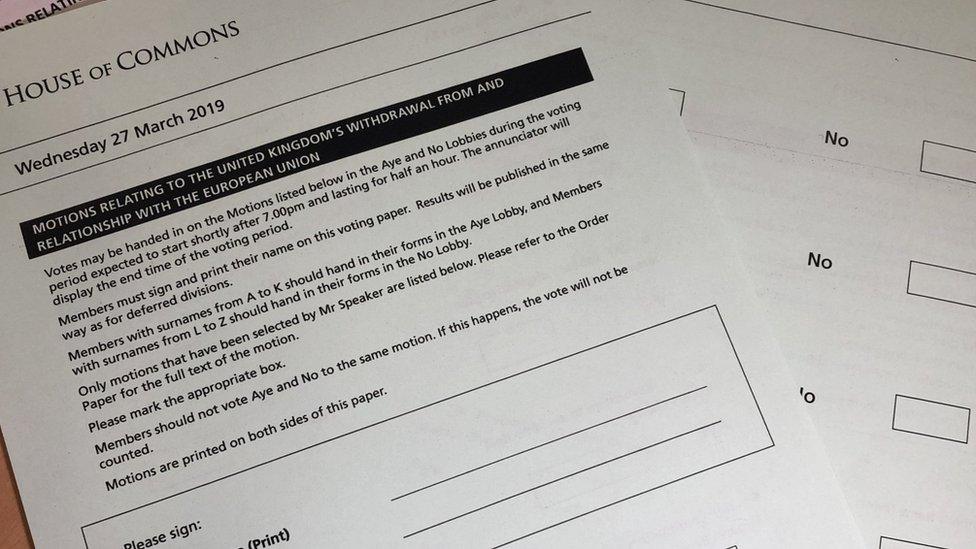
MPs had half an hour to fill out the ballot paper
MPs are awaiting the results of votes on eight different proposals for the future of Brexit.
Options they are considering include leaving without a deal, a customs union and a confirmatory referendum.
Speaker John Bercow will announce what support there is for each later after MPs took over the Commons timetable.
Theresa May has promised to stand down as prime minister if her own deal is approved, prompting several Tory Brexiteers to say they will back it.
Meanwhile, MPs have approved the legislation required to change the date of Brexit from 29 March - after the EU agreed to give the UK an extension last week.
Friday had long been the day written into law for the UK to leave the EU but the Commons approved a statutory instrument - by 441 votes to 105 - changing the deadline to 22 May if a withdrawal agreement is passed this week; or 12 April if it is not.
The prime minister is still trying to drum up support for her withdrawal agreement despite it being voted down by a large margin twice and the DUP saying they still cannot vote for it.
The government is seeking the support of MPs for the Commons to convene on Friday, if necessary, amid reports a third vote on the PM's deal could be held then.
But Mr Bercow reiterated his earlier warnings that the PM's deal could not come back for a vote if it had not significantly changed.
He said the government "should not seek to circumvent my ruling" by introducing procedures that could reverse his judgement.
John Bercow: "I do expect the government to meet the test of change."
But a Downing Street spokesman said there had been a "significant development" at the summit in Brussels last week, after Mrs May agreed "extra reassurances" over the Irish backstop with the EU, and the date of exit had changed.
Allow X content?
This article contains content provided by X. We ask for your permission before anything is loaded, as they may be using cookies and other technologies. You may want to read X’s cookie policy, external and privacy policy, external before accepting. To view this content choose ‘accept and continue’.

MPs are currently voting on a statutory instrument to confirm a delay, after the UK was given until 12 April to propose a different way forward if the current agreement cannot get through Parliament and until 22 May to finalise Brexit if the deal is passed.
Earlier on Wednesday, MPs took control of parliamentary business from the government for several hours as they attempt to find a majority for the next steps in the Brexit process.
Conservative backbencher Sir Oliver Letwin, whose cross-party proposal ushered in today's debate, said the only way leaving the EU with no-deal can be prevented is by crystallising an alternative majority and trying to carry it forward.
He said that if MPs supported the prime minister's deal in another meaningful vote this would be "the easy route".
But he added that he "profoundly hopes" that if on Monday there is a majority view in favour of a particular position, that the government will say that it will carry that forward.

Bercow's intervention versus May's deal
By Ben Wright, BBC political correspondent
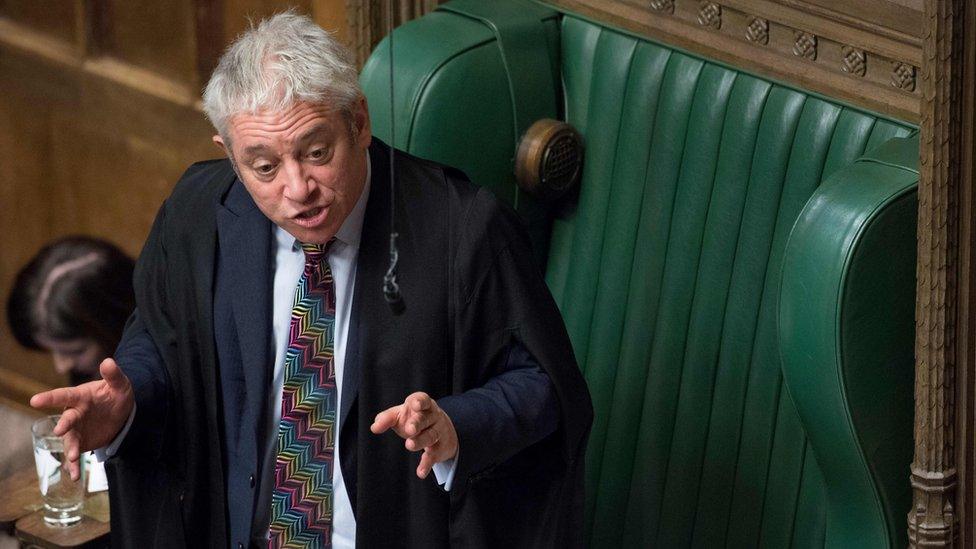
Never afraid of stoking controversy, the Speaker has again infuriated many Tory MPs with his latest surprise pronouncement to the Commons.
Just as it seemed the government was poised to try and get its Brexit deal through again, John Bercow took it upon himself to tick ministers off before they had even tried.
Why? Because last week he ruled the deal could not be brought back to the Commons for a third time without "substantial" changes.
No 10 will only bring the deal back for a third vote if it thinks it could pass. That probably requires DUP backing and a guarantee some Labour MPs will vote for it too.
As it stands, there isn't yet a majority for the deal, but the mood is shifting fast.

What options are MPs voting on?
Groups have put forward different options for the UK's future relationship with the EU, with several based on the assumption Mrs May's withdrawal agreement with the EU will be approved - albeit with changes to the controversial Northern Ireland backstop.
The Speaker of the House, John Bercow, chose eight to be voted on by MPs.
They are:
No-deal Brexit - Leave the EU on 12 April without a deal - Tory MP John Baron
Common Market 2.0 - The UK joins the European Economic Area and negotiates a temporary customs union until alternative arrangements can be found - Tory MP Nick Boles
EFTA/EEA - Similar to Common Market 2.0 but rejects any kind of customs union with the EU and says the Irish backstop must be replaced with alternative arrangements - Tory MP George Eustice
Customs union - Calls for the UK to negotiate a permanent customs union with the EU after Brexit - Tory MP Ken Clarke
Labour's alternative plan - A customs union with the EU and "close alignment" with the single market - Labour leader Jeremy Corbyn
Revoke Article 50 - Cancel Brexit if the UK gets within days of leaving without a deal. MPs would be asked to vote on a no-deal exit and if they rejected that, Article 50 would be revoked - SNP MP Joanna Cherry
Confirmatory public vote - Parliament cannot ratify or implement any agreement on the UK's withdrawal and future relationship "unless and until they have been approved by the people of the UK in a confirmatory public ballot" - Labour MP Margaret Beckett
Malthouse Plan B - The UK makes its budgetary contributions to the EU to the end of 2020 and agrees with the EU a period of two years in which UK goods have full access to the EU - Tory MP Marcus Fysh
How will the process work?
After a four-hour debate on each proposal, MPs were given a piece of paper listing the options, and had to mark each one with a "yes" or "no".
MPs used both lobbies for completing the ballots in a process that took about half an hour.
Several MPs, including Tory Michael Fabricant and Lib Dem Jo Swinson, posted images of their forms on social media.
Allow X content?
This article contains content provided by X. We ask for your permission before anything is loaded, as they may be using cookies and other technologies. You may want to read X’s cookie policy, external and privacy policy, external before accepting. To view this content choose ‘accept and continue’.
Allow X content?
This article contains content provided by X. We ask for your permission before anything is loaded, as they may be using cookies and other technologies. You may want to read X’s cookie policy, external and privacy policy, external before accepting. To view this content choose ‘accept and continue’.
Allow X content?
This article contains content provided by X. We ask for your permission before anything is loaded, as they may be using cookies and other technologies. You may want to read X’s cookie policy, external and privacy policy, external before accepting. To view this content choose ‘accept and continue’.
The process is likely to continue on Monday as MPs seek to whittle down options which could command majority support in Parliament.

Timetable for Wednesday in Parliament
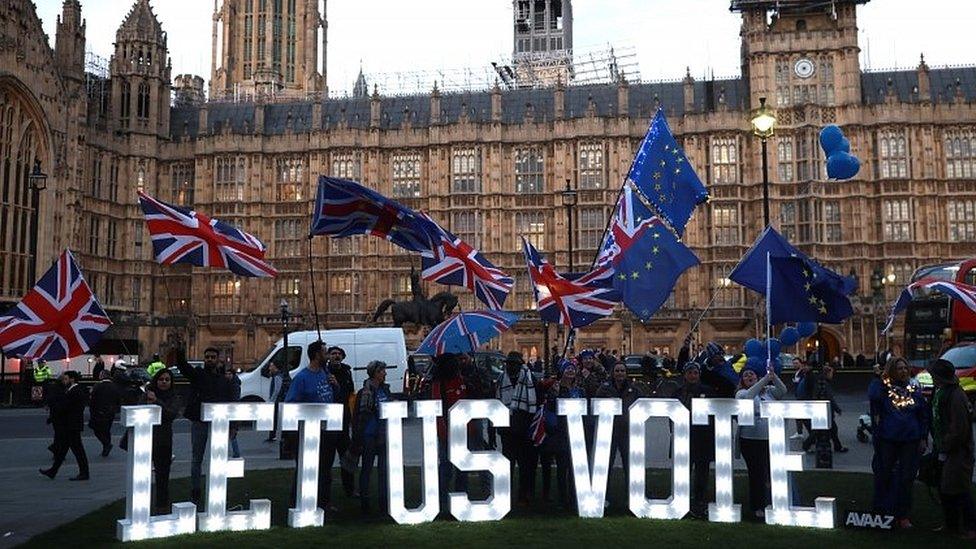
Now: Debate on statutory instrument (SI) bringing Brexit delay into law
21:00: Vote on SI
21:30: The Speaker announces the results of the indicative votes - though he could announce them earlier during SI debate
All times approx

How are MPs likely to vote?
Conservative MPs were given a free vote, meaning they were able to support or reject any proposal without pressure from party whips. Cabinet ministers will be abstaining.
The decision followed warnings that more than a dozen ministers might quit if they were told they had to follow party orders.
Labour MPs are being whipped to support the party's own proposal, as well as motions on a customs union, Common Market 2.0 and a confirmatory public ballot.
Mr Starmer told the Commons any deal "needs further democratic approval" before being enacted.
But the move has angered Labour MPs in Brexit-vote constituencies, with Great Grimsby MP Melanie Onn reportedly resigning as a shadow housing minister.

- Published26 March 2019
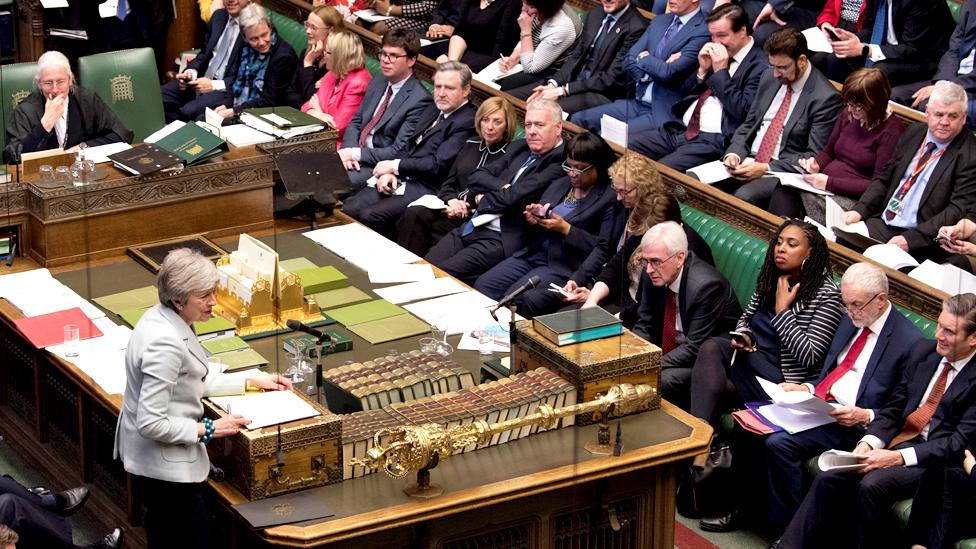
- Published25 March 2019

- Published25 March 2019
